This article reads like a press release or a news article and may be largely based on routine coverage .(April 2014) |
Lucinda Bruce-Gardyne FRSE is a Scottish chef and writer who specialises in cookery and food allergies.
This article reads like a press release or a news article and may be largely based on routine coverage .(April 2014) |
Lucinda Bruce-Gardyne FRSE is a Scottish chef and writer who specialises in cookery and food allergies.
Lucinda Bruce-Gardyne studied Physiology at Queen Mary University of London. [1] After graduation, she trained at Leiths School of Food and Wine in London and worked as a section chef at Terence Conran's restaurant Bibendum. [2] In 1998, she returned to teach at Leiths, where she was commissioned to write the Leiths Techniques Bible.[ citation needed ]
She lives in Edinburgh with her husband and three children, two of whom suffer from dairy, egg and wheat allergies. [3]
After publishing her book on cooking for food allergies in 2007, Bruce-Gardyne worked on developing the recipe for a perfect, fresh gluten-free loaf. In April 2009, she launched Genius Fresh White and Brown Gluten and Wheat Free bread into the retail market the UK and founded the company Genius Foods Ltd [4] based in Edinburgh.
Genius bread has won three awards since its launch – Award for the Most Innovative Product from Coeliac UK; [5] Award for Innovation at the Foods Matter Free-From Food Awards; [6] and Award for Innovation at the Bakery Industry Awards. [7]
Bruce-Gardyne was elected a Fellow of the Royal Society of Edinburgh in March 2017. [8]

Gluten is a structural protein naturally found in certain cereal grains. The term gluten usually refers to the elastic network of a wheat grain's proteins, gliadin and glutenin primarily, that forms readily with the addition of water and often kneading in the case of bread dough. The types of grains that contain gluten include all species of wheat, and barley, rye, and some cultivars of oat; moreover, cross hybrids of any of these cereal grains also contain gluten, e.g. triticale. Gluten makes up 75–85% of the total protein in bread wheat.

Bread is a staple food prepared from a dough of flour and water, usually by baking. Throughout recorded history and around the world, it has been an important part of many cultures' diet. It is one of the oldest human-made foods, having been of significance since the dawn of agriculture, and plays an essential role in both religious rituals and secular culture.

Flour is a powder made by grinding raw grains, roots, beans, nuts, or seeds. Flours are used to make many different foods. Cereal flour, particularly wheat flour, is the main ingredient of bread, which is a staple food for many cultures. Corn flour has been important in Mesoamerican cuisine since ancient times and remains a staple in the Americas. Rye flour is a constituent of bread in both Central Europe and Northern Europe.
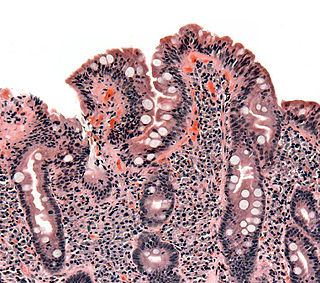
Coeliac disease or celiac disease is a long-term autoimmune disorder, primarily affecting the small intestine, where individuals develop intolerance to gluten, present in foods such as wheat, rye and barley. Classic symptoms include gastrointestinal problems such as chronic diarrhoea, abdominal distention, malabsorption, loss of appetite, and among children failure to grow normally. Non-classic symptoms are more common, especially in people older than two years. There may be mild or absent gastrointestinal symptoms, a wide number of symptoms involving any part of the body, or no obvious symptoms. Coeliac disease was first described in childhood; however, it may develop at any age. It is associated with other autoimmune diseases, such as Type 1 diabetes mellitus and Hashimoto's thyroiditis, among others.

A gluten-free diet (GFD) is a nutritional plan that strictly excludes gluten, which is a mixture of prolamin proteins found in wheat, as well as barley, rye, and oats. The inclusion of oats in a gluten-free diet remains controversial, and may depend on the oat cultivar and the frequent cross-contamination with other gluten-containing cereals.

Sacramental bread, also called Communion bread, Communion wafer, Sacred host, Eucharistic bread, the Lamb or simply the host, is the bread used in the Christian ritual of the Eucharist. Along with sacramental wine, it is one of two elements of the Eucharist. The bread may be either leavened or unleavened, depending on tradition.

Gliadin is a class of proteins present in wheat and several other cereals within the grass genus Triticum. Gliadins, which are a component of gluten, are essential for giving bread the ability to rise properly during baking. Gliadins and glutenins are the two main components of the gluten fraction of the wheat seed. This gluten is found in products such as wheat flour. Gluten is split about evenly between the gliadins and glutenins, although there are variations found in different sources.
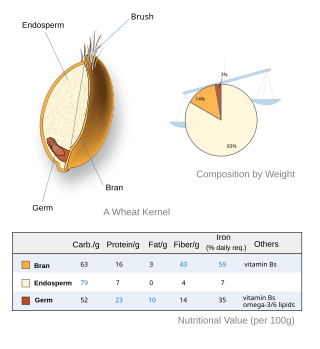
A whole grain is a grain of any cereal and pseudocereal that contains the endosperm, germ, and bran, in contrast to refined grains, which retain only the endosperm.
Susan Spaull is a cookery writer, teacher and chef. She trained at Leiths School of Food and Wine in London and went on to become one of their senior teachers. She has written several cookery books for Leiths including Leiths Techniques Bible which won a Gourmand World Cookbook Award for the "Best Book in the World for Food Professionals" in 2003. She also does food photography, demonstrations and recipe development.
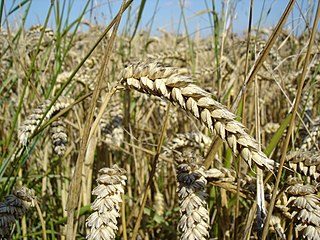
Wheat allergy is an allergy to wheat which typically presents itself as a food allergy, but can also be a contact allergy resulting from occupational exposure. Like all allergies, wheat allergy involves immunoglobulin E and mast cell response. Typically the allergy is limited to the seed storage proteins of wheat. Some reactions are restricted to wheat proteins, while others can react across many varieties of seeds and other plant tissues. Wheat allergy is rare. Prevalence in adults was estimated to be 0.21% in a 2012 study in Japan.
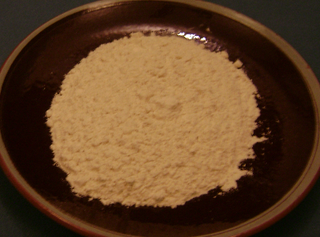
Gluten is the seed storage protein in mature wheat seeds. It is the sticky substance in bread wheat which allows dough to rise and retain its shape during baking. The same, or very similar, proteins are also found in related grasses within the tribe Triticeae. Seed glutens of some non-Triticeae plants have similar properties, but none can perform on a par with those of the Triticeae taxa, particularly the Triticum species. What distinguishes bread wheat from these other grass seeds is the quantity of these proteins and the level of subcomponents, with bread wheat having the highest protein content and a complex mixture of proteins derived from three grass species.

Gluten-related disorders is the term for the diseases triggered by gluten, including celiac disease (CD), non-celiac gluten sensitivity (NCGS), gluten ataxia, dermatitis herpetiformis (DH) and wheat allergy. The umbrella category has also been referred to as gluten intolerance, though a multi-disciplinary physician-led study, based in part on the 2011 International Coeliac Disease Symposium, concluded that the use of this term should be avoided due to a lack of specificity.
Anti-gliadin antibodies are produced in response to gliadin, a prolamin found in wheat. In bread wheat it is encoded by three different alleles, AA, BB, and DD. These alleles can produce slightly different gliadins, which can cause the body to produce different antibodies. Some of these antibodies can detect proteins in specific grass taxa such as Triticeae, while others react sporadically with certain species in those taxa, or over many taxonomically defined grass tribes.
Oat sensitivity represents a sensitivity to the proteins found in oats, Avena sativa. Sensitivity to oats can manifest as a result of allergy to oat seed storage proteins either inhaled or ingested. A more complex condition affects individuals who have gluten-sensitive enteropathy in which there is an autoimmune response to avenin, the glutinous protein in oats similar to the gluten within wheat. Sensitivity to oat foods can also result from their frequent contamination by wheat, barley, or rye particles.
Non-celiac gluten sensitivity (NCGS) or gluten sensitivity is a controversial disorder which can cause both gastrointestinal and other problems.
The gluten challenge test is a medical test in which gluten-containing foods are consumed and (re-)occurrence of symptoms is observed afterwards to determine whether and how much a person reacts to these foods. The test may be performed in people with suspected gluten-related disorders in very specific occasions and under medical supervision, for example in people who had started a gluten-free diet without performing duodenal biopsy.
Jane Devonshire is a British chef and winner of MasterChef in 2016.
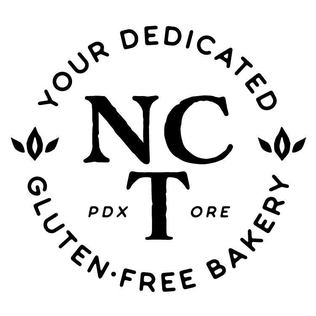
New Cascadia Traditional is a gluten-free bakery in Portland, Oregon.

Askatu Bakery is a Latino- and woman-owned bakery in Seattle's Belltown neighborhood, in the U.S. state of Washington. As an "allergen-free" bakery, Askatu offers gluten-free and vegan options, and avoids eggs, nuts, and wheat. Established by Estela Martinez in 2019, the business has also been a vendor at the farmers' market in the University District. Askatu has garnered a positive reception.